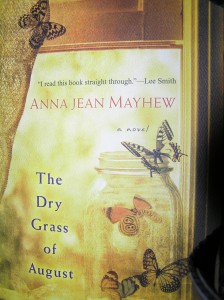The Blog
The Dry Grass of August: Journey within a Journey
It’s appropriate that I found Anna Jean Mayhew’s debut novel, The Dry Grass of August, while I was on a trip. I was enjoying a visit to my home state of North Carolina, and my sister and I were browsing in Purple Crow Books, an independent book store in Hillsborough, when the novel caught my eye. Mayhew is from Charlotte, and since Purple Crow specializes in local authors, her book was right up front. Lucky for me.
It didn’t take many pages for me to be sucked into the crowded Packard carrying the Watts family and their maid, Mary Luther, from Charlotte to Pensacola, Florida, to visit Mrs. Watts’ brother. The year is 1954, and Mr. Watts, who can’t make the trip because of work, tells his wife not to let Mary sit in the front seat. There’re tales of the Klan in Georgia. And thus begins one of the longest journeys of thirteen-year-old Jubie Watts’ life.
Like any good travel novel, The Dry Grass of August provides an interesting assortment of characters whom Jubie meets along the way, including Leesum Fields, a runaway teenager from Mary’s community back in Charlotte, who’s gotten a job with a carnival that’s making a stop in Pensacola. Mary jerks him out of the carnival, and Jubie’s uncle lets him stay at his house until Mary can make arrangements to send him back to North Carolina by bus. To Jubie’s surprise, she and Leesum become friends, but a lot of other people along the way are not so friendly.
From her cousin, who has a secret about her mother, to their Florida neighbor, who doesn’t want Mary allowed on the beach, to her own parents, whose shortcomings are becoming more apparent, Jubie begins to recognize the mixture of fear, love, hate, and sorrow that makes up most human beings. But nothing prepares her for the group of strangers she encounters on the way home. The trip from North Carolina to Florida and back again is only several hundred miles, but Jubie’s internal journey takes her a long way in dealing with life.
With keen perception and skill, Mayhew creates the feel of the mid-twentieth-century South, but none of her characters feels like a stereotype. Her dialogue, which comprises much of the book, rings true throughout. The complexities of the relationships among all the characters ring true, as well. While the story has the trappings of many southern stories that have come before it, the characters are as individual as your neighbors and your family, and that makes the book worth reading.
Tags: Books
Get in Touch
Follow on Facebook
Follow on Twitter
___________________________________________________
Website Design by Eliza Whitney
 Posts from Late Last Night Books
Posts from Late Last Night Books





4 Comments
Dear Sally Whitney,
You’ve written a fine review of my novel, and I deeply appreciate the time you took and the depth of your comments. I grew up in Charlotte (as I guess you know), but only began writing about it after I’d moved to the middle of the state…and I’m still doing that. Am now working on another novel that’s also set in Charlotte, but in the mid-60s, and reviews such as yours are encouraging me to continue on this journey of discovery of my home town. Thank you!!
Dear A.J.,
I really liked The Dry Grass of August, so I’ll be looking forward to your next novel. By the way, I noticed that Peggy Payne wrote one of the cover blurbs for your novel. Peggy and I were in the same dorm at Duke back when my name was Sally Mann. If you’re in contact with her, give her my regards.
Sally, I just saw your blog. I read this wonderful book last year and really enjoyed it. I am always on the look out for North Carolina authors to read. I will be keeping up with your interesting blog. Good to hear from another Elkinite.
Thanks, Sara, for stopping by my blog. I hope you’ll continue to visit. I’m looking forward to A.J. Mayhew’s next novel and will surely write about it here when it comes out.